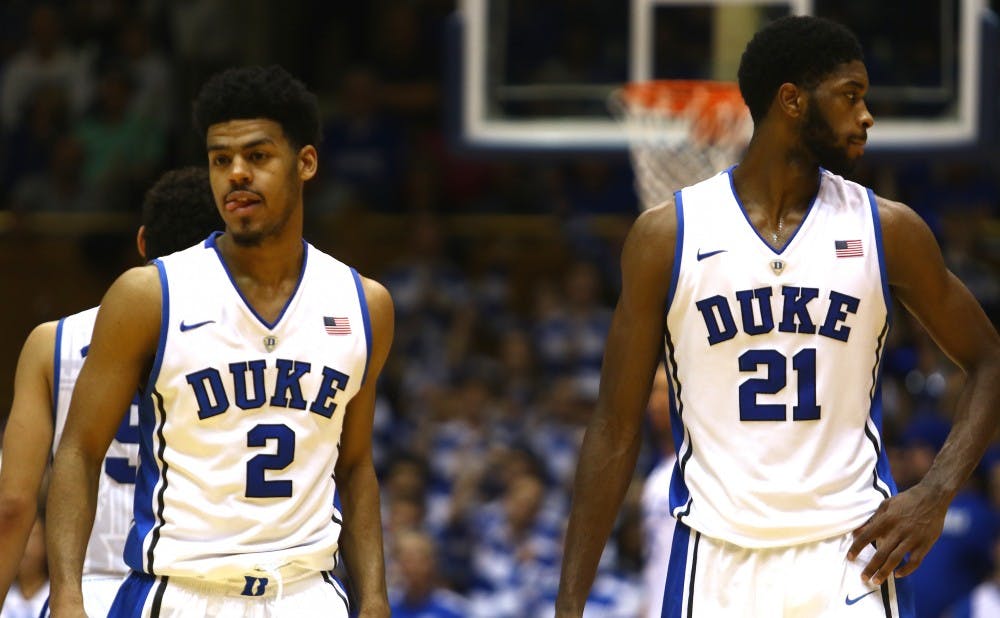Athletes are the ultimate creatures of habit, which makes sense, considering their physical skills are solidified through muscle memory and constant repetition. Since the beginning of professional sports, athletes have had countless on-field quirks that separated them from the rest—from a recognizable stance in the batter's box to a unique ritual before shooting a free-throw.
As the lines became blurred between athletes and celebrities, these idiosyncrasies have become more grandiose, more theatrical. In today's sports world, having a unique signature is essential because branding has more revenue-generating potential than on-field performance.
Ten years ago, LeBron James was throwing chalk in the air before games. It was tolerable—he was the game's youngest star and had the skills to back it up. Now everyone follows suit in search of their own signature—their own trademark—because in the age of the 24-hour news cycle and social media, these things have a knack for going viral.
Now we have everything from Carolina Panthers quarterback Cam Newton signaling for a first down every time he runs to New York Giants wide receiver Victor Cruz's salsa dance. Los Angeles Lakers guard Nick Young even has his own viral alter-ego—the always-entertaining Swaggy P.
Recently, Seattle Seahawks running back Marshawn Lynch has gained attention for a ritual he performs off the field. In an effort to avoid talking to the media after games, Lynch gives the same one-word answer to every question. He's been resorting to these tactics for the better part of the last two seasons.
The first time he did it, it took the sports media completely by surprise. Transcripts of Lynch's "interviews" became stories themselves. The NFL tried to step in, levying two fines totaling $100,000 against Lynch for violating the league's media policy. He didn't even make himself available to the media after Seattle's overtime win against the Green Bay Packers in Sunday's NFC championship game.
Just like LeBron's on-court theatrics, players across the sports world are starting to follow suit. After posting a monster triple-double of 17 points, 15 rebounds and 17 assists Friday, Oklahoma City Thunder point guard Russell Westbrook answered every question by attributing his successes to "good execution." Over the weekend, clips of his interview racked up millions of views on YouTube.
When asked if he was upset with something, Westbrook responded, "I just don't like you."
Contrary to what coaches, players and many of our readers believe, members of the sports media aren't complete idiots—we understand that talking to us is rarely the favorite part of any athlete's day. In the last four years, I've interviewed hundreds of college and professional athletes and coaches. Sometimes my interviews were conducted while my subjects were butt-naked at their locker. Others lasted fleeting moments in an elevator at a charity event—that is to say, it probably wasn't always convenient for them.
Nevertheless, being a professional athlete is an occupation and talking to the media is part of the job description. Even the best jobs in the world have tasks that are hardly enviable. For media members, it is the arduous task of transcribing interviews—maybe for athletes, it is giving them.
A week ago, I walked into what may have been one of the most depressing locker rooms I've seen during my time in journalism. Duke had just gotten blown out by Miami at home—the Blue Devils' second consecutive conference loss. The game had ended late and we knew that after a loss that bad there would only be a few minutes for questions—typically when a team's spirits are this low, freshmen shy away from the cameras and let their captains do the talking.
Many players had already made their way to the showers by the time the locker room door opened, but even after one of the worst losses of their Duke careers, Quinn Cook and Amile Jefferson were waiting to take our questions. I could still see the tears in their eyes as they spoke, and even though they were still struggling to put their loss into words, they gave full and honest answers.
As journalists, we know that every team is going to have its talkers and others are less comfortable speaking to the media. We don't resent players for giving bad quotes because we know they are at least trying their best to do their jobs so we can do ours.
When players decide that they are too important to answer a few minutes of questions, they give athletes a bad name.
Get The Chronicle straight to your inbox
Signup for our weekly newsletter. Cancel at any time.

